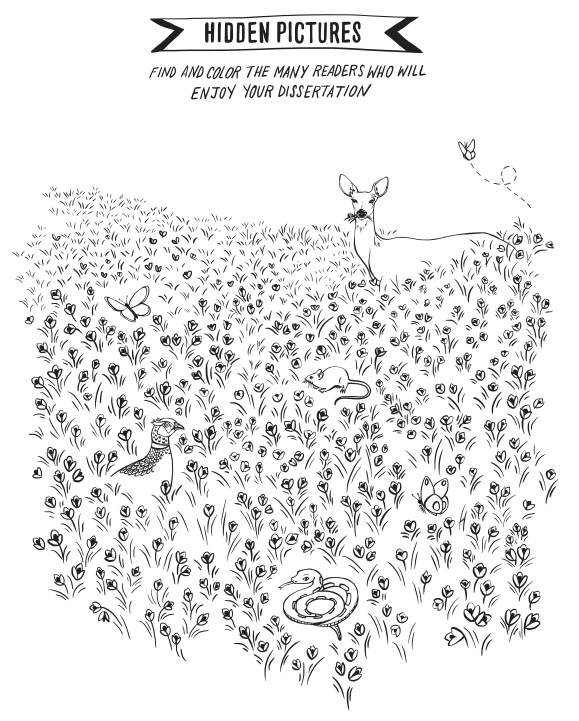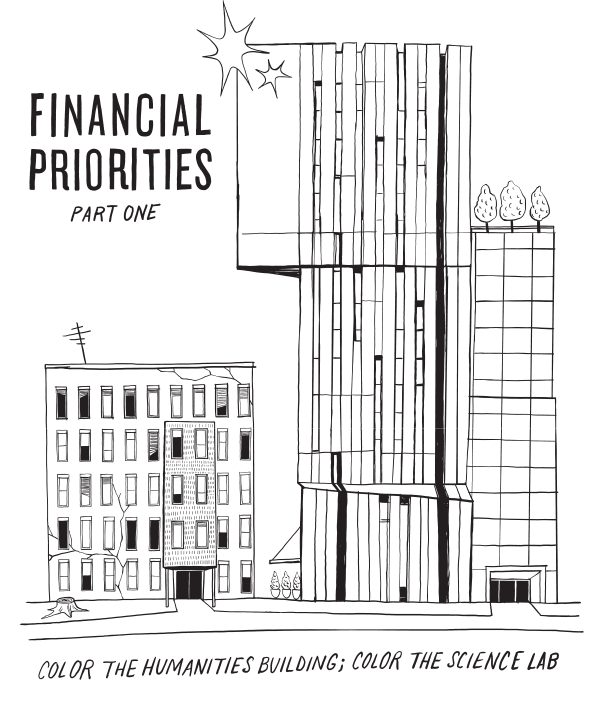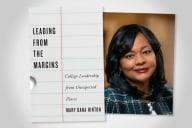You have /5 articles left.
Sign up for a free account or log in.
Julie Schumacher is not your typical writer when it comes to depicting (and poking fun at) academic life. Dear Committee Members, her 2014 work, was an epistolary novel written entirely in the form of letters of recommendation. All the letters are from Jason T. Fitger, professor of creative writing and English at fictional Payne University.
Now Schumacher is back with Doodling for Academics (University of Chicago Press), which is described as a "coloring and activity book."
Pages have images that reflect life in academe. There are two pages called "Financial Priorities." The first invites readers to color in two buildings: a humanities building (cracks in the wall, old-fashioned blinds, a tree stump) and a science building (shining glass facade, shrubbery and, of course, trees on the roof). The second invites readers to color in the new football stadium.
While administrators take plenty of grief in the book, the humor also points out foibles of faculty members and of those who love them. One page, called "Cheering Section," has speech bubbles to color in featuring quotes from relatives of a professor.
They include questions like, "Your cousin Bix already finished his law degree" and "That must be nice, working only a few hours a day." A page on fashion invites the reader to match various accessories (a whip and a bong, among others) with various personae of academe: grad student, donor, department chair and so forth.
A page inspired by the board game Life features squares saying things such as, "Vengeful colleague -- go back one space" and "Failure to publish -- stay here forever." Those whose rolls of the dice succeed eventually hit full professor, followed by death.
Schumacher, a professor and director of creative writing at the University of Minnesota Twin Cities, wrote the text. Lauren Nassef did the illustrations. Schumacher responded via email to some questions.
 Q: How did your colleagues react to Dear Committee Members? Did any come forward to suggest too close a resemblance to any characters?
Q: How did your colleagues react to Dear Committee Members? Did any come forward to suggest too close a resemblance to any characters?
A: I was very conscientious about not portraying real-life people, especially my colleagues, in Dear Committee Members. I love my job at the University of Minnesota and am not interested in endangering it. And my colleagues were very happy about the book; the dean even threw a party for me! One or two of my colleagues did ask me, after the book was published, whether I had used them as a model for Character X or Character Y, and I always, truthfully, said no. The only real resemblance is between Jay Fitger and me. He is the small, evil voice inside my head that I typically keep locked securely away.
Q: What led you to pick the genre of coloring and activity booklet?
A: The University of Chicago Press -- and editor Christie Henry -- came up with the idea and contacted me. At first I thought it was ridiculous, then I realized that it might be amusing. At a certain point in my writing career, having experienced the usual frustrations, I decided not to engage in projects unless they offered me some degree of pleasure and surprise. Doodling for Academics offered a good deal of both.
Q: Do you think professors who read this will actually color? Or just chuckle at the suggestions?
A: I know professors who do needlepoint or knit during faculty meetings; plenty furtively read email or doodle. Pulling out a coloring book and a set of crayons might raise a few eyebrows, but who knows? I think some newly minted Ph.D.s may be receiving the book as a gift.
 Q: You have a bunch of pages (such as "Financial Priorities") that skewer inequities in higher education, in this case the relative comfort of buildings that house different kinds of departments. Do you think campus leaders might be moved by your critique? Any concerns administrators may not love the way their values are portrayed?
Q: You have a bunch of pages (such as "Financial Priorities") that skewer inequities in higher education, in this case the relative comfort of buildings that house different kinds of departments. Do you think campus leaders might be moved by your critique? Any concerns administrators may not love the way their values are portrayed?
A: There are inequities in higher education, and, at the current moment, there is an emphasis on the STEM fields while the arts are often considered gratuitous. I direct the creative writing program at the University of Minnesota, and I know that literature and the arts help to make people's lives meaningful and worth living. We are not all cut out to be scientists or engineers, and higher education should, I believe, encourage intellects and abilities across the spectrum of disciplines.
Q: Will you move on to another genre for your next work on higher education? Any ideas?
A: I've written short stories and novels and five books for children, as well as a coloring and activity book. I'm open to almost anything.








